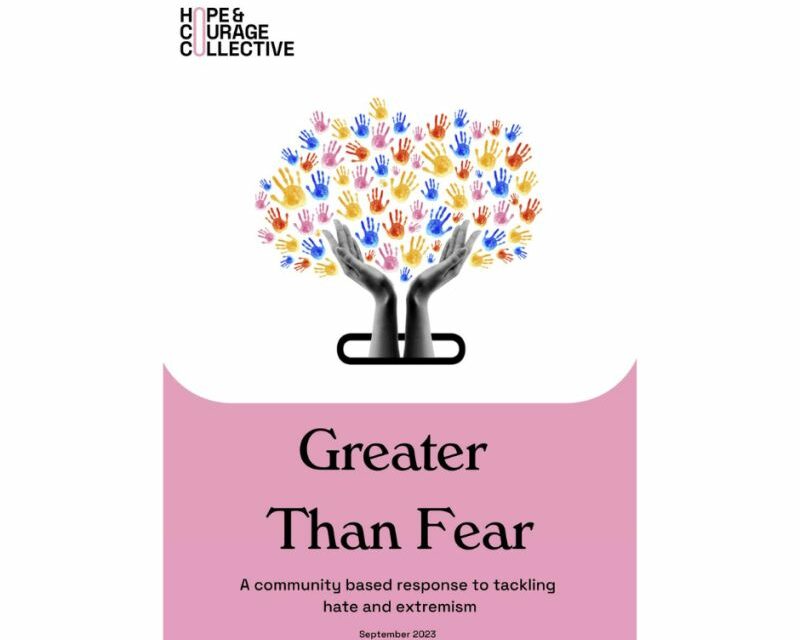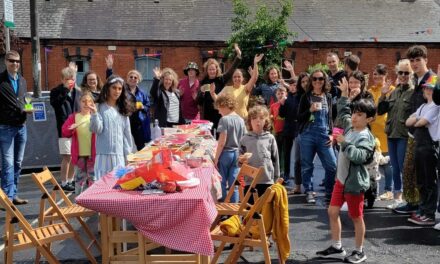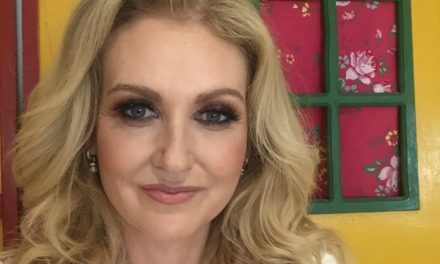A 61-page report titled ‘Greater than Fear: A Community Based Response to Tackling Hate and Extremism’ was published in early September and draws on experience in five Irish towns countering hate and fascism.
Written by community worker Helen Lowry and published by the Hope and Courage Collective (H&CC – formerly known as the Far Right Observatory) it provides free advice and tips on what helps or hinders community responses to extremism and hate.
Helen worked for many years with Migrant Rights Centre Ireland, and this is the first Irish publication to document the response within communities to the recent rise in fascism.
It should be useful to youth and community workers and volunteers because it shows how the far right operates. The report features case studies with first-hand accounts from locals who took them on.
The publication draws on experience from five places in particular where hate arose – in counties Galway, Cork, Mayo, Kildare and Dublin. It seeks to explain where hate comes from and includes a messaging guide to help frame community responses.
“Even the most experienced organisers and activists went on a learning journey in the case studies shared here,” it says, and its community-to-community tips for “if hate comes your way” were hard-learned.
Surprisingly, the report does not mention community development workers funded through the Social Inclusion and Community Activation Programme (SICAP) – yet they will be among those to find the report of considerable interest. There are 600 such workers countrywide employed by local development companies (LDCs), including 100 or so new Ukrainian community development workers hired last year.
Under the report’s chapter on ‘Leadership in Action’, LDCs are only mentioned twice – once positively, once negatively. While they also helped with integration, there is but a single mention of a Family Resource Centre (described as “progressive”).
However, the publication isn’t a thank you card, and its case studies draw on experience from five places in particular where events turned nasty – Oughterard, Co Galway; Ballymun in Dublin; Newbridge, Co Kildare; Westport, Co. Mayo; and Fermoy, Co Cork. In four of the case studies, local people rose to support refugees and people seeking international protection, succeeding in three of those places – Ballymun, Fermoy and Newbridge.
In Oughterard, the report acknowledges that the campaign opposing a Direct Provision centre “cannot be solely attributed to the far right, nor can all local participation be labelled as anti- immigration and racist”.
In Westport, people mobilised to counter-protest successfully against Christians who were joined by far right activists, to ensure a drag queen story hour in a local bookshop went ahead. Overall, the report concluded that, “A critical factor was having people involved who are not afraid to respond quickly and who had shared values, community development expertise, community engagement skills and life/work experience.”
In Ballymun, local football legend Philly McMahon and rapper Adam Muhammad publicly supported Ballymun for All. The group grew in strength and joined a broader coalition, Dublin for All, that led to the national rally in Feb 2023 attended by thousands of people.
However, counter-campaigning was difficult when in an information vacuum. It left community leaders on the back foot. “It emasculated us as community people,” said one. The report also states that the “erosion” of the community development space was “a concern” and the case studies show that “traditional community and civil society organisations and structures were slow to respond in nearly all areas”.
As a volunteer in Newbridge told the author: “The response was so dependent on us as volunteers. Paid people in the room [were] there only on a voluntary basis. Nobody bar H&CC could support us on a professional basis.” The report tackles the question: ‘What do communities and society need to flourish in the face of hate?’ An ongoing problem, says the author, is “a lack of recognition and by extension funding for community organising”.
There are 30,000-plus community groups in the State, but community organising, advocacy and activism puts you at risk of being penalised or, if you are funded, of losing funding.
The report quotes community workers who said: “Campaigning and activism isn’t really a legitimate activity in Ireland. It’s not paid for, we’ll only fund service provision. So I think we need to pivot from this and legitimise community organising and community work in this manner so individuals don’t feel they’ll get slapped on the wrist by being at the front of a response like this. I think that’s very important”.
“This issue won’t be going away in the medium to long-term,” they said. The report argues that communities need back-up “if community efforts are to evolve from fire-fighting to effective inoculation against the far right.”
The report outlines the conditions that are facilitating the far right’s rise, including the “housing crisis, deepening inequality, cost of living pressures and societal and cultural shifts (which can) be overwhelming for many people”.
Pointing out how people listen with their hearts not their heads, it says: “The far right thrives in an environment of confusion, rumour, and information vacuums.” It says “the chill effect” on politicians is real and that “the more politicians stay quiet or attempt to speak to their agenda, the more emboldened the far right becomes”.
It further states that “Ireland is a wealthy country, and this government’s choices create the conditions for the far right to thrive.” It lists what liveable communities need: secure homes, trusted healthcare, quality schools, decent work and good incomes, great youth work and a strong community development infrastructure.
Far Right Observatory now known as the Hope and Courage Collective
The Far Right Observatory, which has made a solid impression on many community groups fighting fascism, has renamed itself the Hope and Courage Collective, and remains focused on far right hate, bigotry and extremism.
It sees itself as “a national civil society organisation that works with community groups, advocacy groups, trade unions, activists and academics to stop hate organising in our communities and workplaces”.
Its members include: Community Work Ireland, Pavee Point, Uplift, the Movement of Asylum Seekers in Ireland, the Irish Network Against Racism, SIPTU, Unite, Migrant Rights Centre Ireland, BelongTo, Trans Equality Network Ireland, the National Women’s Council and the Irish Council for Civil Liberties.
W: hopeandcourage.ie/
FB: @hopeandcouragecollective
X: @hope_courage_ie
I: @hopeandcouragecollective





